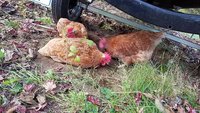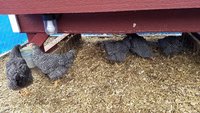Chickens are very hardy animals. That's a credit that isn't often given to them. They can handle cold typically quite well, often easily into the teens (in Fahrenheit). However, how cold is too cold for chickens of various ages?
Feather footed breeds like Cochins and D'Uccles and breeds with smaller combs like Brahmas, Easter Eggers, Wyandottes and Chanteclers tend to serve better in colder climates.
Often, Mediterranean breeds and breeds with large single combs such as Leghorns, Anconas, Andalusians, Campines, etc tend to suffer more in the cold, especially the roosters.
Chickens in housed in wet environments don't pair well with biting cold.

But they can surprise us. I know that some owners in the far north keep their birds without heat. How? Do you suffer losses? And, additionally, for everyone, when is it too cold for younger birds?
Cyprus
Feather footed breeds like Cochins and D'Uccles and breeds with smaller combs like Brahmas, Easter Eggers, Wyandottes and Chanteclers tend to serve better in colder climates.
Often, Mediterranean breeds and breeds with large single combs such as Leghorns, Anconas, Andalusians, Campines, etc tend to suffer more in the cold, especially the roosters.
Chickens in housed in wet environments don't pair well with biting cold.
But they can surprise us. I know that some owners in the far north keep their birds without heat. How? Do you suffer losses? And, additionally, for everyone, when is it too cold for younger birds?
Cyprus






